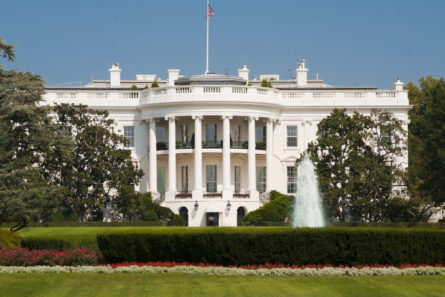Explainer Episode 37 – The Defense Production Act During War and Peacetime

In this episode, J. Kennerly Davis, Jr., former Deputy Attorney General for the Commonwealth of Virginia, discusses the historical origin of the Defense Production Act, the powers the Act gives to the president, and recent presidents’ invocation of the Act in pursuit of public policy objectives.
Transcript
Although this transcript is largely accurate, in some cases it could be incomplete or inaccurate due to inaudible passages or transcription errors.
[Music and Narration]
Introduction: Welcome to the Regulatory Transparency Project’s Fourth Branch podcast series. All expressions of opinion are those of the speaker.
Steven Schaefer: Hello, and welcome to the Regulatory Transparency Project’s Explainer Podcast on The Defense Production Act and how recent presidents have used it. My name is Steven Schaefer, and I am the Director of The Federalist Society’s Regulatory Transparency Project. We are pleased to have with us today, Ken Davis, a senior attorney, and former Deputy Attorney General for the Commonwealth of Virginia. Ken has over 40 years of experience in the private practice of law, in public service, and in corporate management involved with the changes in the electric power industry. To learn more about Ken’s many accomplishments, please find out more at fedsoc.org. Welcome, Ken.
J. Kennerly Davis, Jr.: Well, thank you Steve, and thanks for the opportunity to get together today and discuss what has become in recent months a focus of attention and certainly a very very important subject, that is the Defense Production Act.
Steven Schaefer: Thank you, Ken. So the Defense Production Act has been in the news several times recently.
J. Kennerly Davis, Jr.: It certainly has. On June 6th, for example, President Biden invoked the act to accelerate the domestic production of solar panels and other energy technologies needed to advance his overall plan to transition away from the domestic production and use of oil and natural gas. A bit farther back, on May the 18th, he invoked the act to increase the domestic supplies of infant formula. And, on March 31st, he invoked the act to step up the domestic mining and processing of minerals needed for electric vehicle batteries and for large scale electric grid connected storage batteries. And all the way back in February 2021, he invoked the act to increase production of Covid vaccines, test kits, personal protective equipment, masks, and gloves, and things like that — all related to the pandemic.
Now, back in the Trump administration, President Trump also resorted to the Defense Production Act during the pandemic, invoking it to spur the production of medical ventilators and other supplies and also to counter supply chain disruptions in the domestic meat industry. And in 2018, he didn’t invoke the act, but the Trump administration considered invoking the Defense Production Act to require electric utilities and transmission companies to purchase electric power from coal and nuclear generators that were deemed critical to electric grid reliability. And by those purchases and the economic support resulting from those purchases, to prevent the premature retirement of those critical generators for economic reasons.
Steven Schaefer: Well, that’s quite a range of products — solar panels, Covid swabs, infant formula, beef and pork. How does the production of all of these things relate to national defense?
J. Kennerly Davis, Jr.: Well, it’s a good question. It’s a natural question and one that highlights key issues related to the original purpose of the statute and overtime the continuing congressional delegation of more and more authority to the executive and the very real constitutional risks that are posed by governments increasing reliance on emergency powers to direct the investment decisions and operations of private industry.
Steven Schaefer: And what about the original statute itself? When was the Defense Production Act put into law?
J. Kennerly Davis, Jr.: Well, it’s very much a Cold War enactment. The Defense Production Act, which is found in 50 USC Chapter 55, was passed in September 1950, then as a temporary emergency measure following the communist invasion of South Korea in June of that year. The enactment was part of a broad civil defense and war mobilization effort. Remember that 1950 was just five years after the end of World War II and the lowering of the iron curtain across Europe, one year after the first detonation of an atomic bomb by the soviets, and one year after the fall of mainland China to the communists. So those were, in 1950, trying times — trying times indeed — when war and the national defense and what we needed to do as an industrial base to support national defense were very much in the forefront.
The original statute granted broad authority to the president to control economic policy. The act contained seven separate titles empowering the president to demand that manufacturers give priority to defense production, gave the president power to requisition materials and property, to expand government and private defense production capacity, ration consumer goods, fix wages and prices, force the settlement of some labor disputes, control consumer credit and regulate real estate construction credit, provide antitrust protection to industry, and also establish a voluntary reserve of private sector executives who would be available for emergency federal employment — sweeping powers in the seven titles.
Now, four of those seven titles — those with authorities related to requisitioning, rationing, wage and price fixing, labor disputes and credit controls — those authorities and those titles terminated in 1953 because remember, this was a temporary emergency enactment. So they terminated. Much of it terminated in ’53 with the ceasefire in Korea, and Congress did not act to extend the entire act. But then, and since then, since 1953, the remaining authorities contained in three titles — titles one, three, and seven, have been repeatedly reauthorized by the Congress. The act was last reauthorized in 2019 when Congress extended it again with a termination date this time in six years or September 2025.
Now, over the years, Congress has made some of the authorities in the remaining titles permanent such as one in Title Seven for government review of foreign acquisitions of American companies. It’s important to understand and important for people to focus on the fact that the authorities in the remaining titles of the act are largely tied to the definition — the statutory definition — in the act of national defense. That’s contained in Title Seven. In its original form, the act defined national defense as covering “The operation and activities of the armed forces, the atomic energy commission, or other department or agency that is directly or indirectly and substantially concerned with the national defense.” So at the beginning, a very traditional tightly focused definition of national defense. But over the years, as a part of the reauthorization and term extension process, Congress has gradually but steadily broadened the definition of the term “national defense” and in so doing has delegated more and more power to the president to intervene in and direct the private economy.
Now, the concept of national defense extends well beyond traditional military preparedness and includes activities related to homeland security and domestic emergency management. Authorities can now be used to enhance and support domestic preparedness, preparedness for and response to and recovery from natural hazards, terrorist attack, and other national emergencies. So this expansion — you mentioned earlier that the act has been invoked to cover a lot of different items, the production and procurement and support of a lot of different items. And that’s true. And this is the reason. The expansion of the key defined term “national defense” is the reason that we see the act invoked to spur the domestic production of so many different items under so many different circumstances.
Steven Schaefer: You say that three titles remain from the original legislation — Title One, Title, Three, and Title Seven. What do each of these titles cover and what authorities do they provide the president?
J. Kennerly Davis, Jr.: Well, Title One covers what I think can be called supply contracts, government supply contracts. It authorizes the president to what they call prioritize private sector supply contracts for materials, equipment, and services that he deems necessary or appropriate for the national defense. It authorizes the president to require acceptance and preferential performance of supply contracts that have been prioritized. Now, from the perspective of the private sector supplier who’s been approached by the government, that supplier must accept and perform the prioritized contract if the order, material, or service is normally sold by the supplier and the supplier can satisfy the delivery terms. So it’s not a situation where the government will ask something that’s physically impossible of a supplier. But if the supplier can satisfy to terms of the contract and it covers a material or service that’s normally produced and sold by the supplier, then he is required to accept it.
Now, that section, Title One, that section of the act includes a provision in Subsection 4513 that provides “Any person who willfully performs any act prohibited or willfully fails to perform any act required by this Title One or any of the regulations issued under Title One shall, upon conviction, be fined not more than $10,000 or imprisoned for not more than a year or both.” So if you can do it and you willfully decline the government’s offer, willfully refuse to take the contract, and give it preferential performance, then you’re subject to these penalties in the statute. But if it’s physically impossible, you’re not required.
Now, that’s for the government approaching a supplier to contract for the provision of goods or services to the government. Under Title One, the government can also prioritize the acceptance and performance of contracts between and or among private parties if that is needed to promote the national defense. And that played a part in the invocation of the act for the infant formula crisis where suppliers of products needed for the companies to make the formula were directed to enter into contracts with the formula manufacturers.
Now, the president initiates the invocation, but under Executive Order 13603, issued by President Obama, the president has delegated broad Title One contract prioritizing authorities — delegated those broadly to 17 different federal agencies. And, in addition to that, invocations of the act by the president in any case typically include, through the use of an executive order, delegation of situation specific authorities to relevant agencies. For example, delegation of authorities to the HHS when the act was invoked to respond to the Covid pandemic.
Steven Schaefer: So that’s Title One. What about Title Three?
J. Kennerly Davis, Jr.: Well, it’s a different approach there. If Title One is about contracts that people have to enter into to supply things to help support the national defense, Title Three, those authorities are intended to help ensure that the nation has an adequate supply of or the ability to produce essential materials and goods needed for the national defense. So here it’s more about providing funds to the producers for them to make essential goods and materials. Title Three authorities can draw on appropriated funds — funds for the Defense Production Act have to be appropriated by the Congress. But once funded, Title Three authorities can draw on those appropriated funds to provide financial incentives, to develop, maintain, modernize, restore, and expand the production of needed goods by expanding the capacity, the production capacity of domestic sources for components, technology, materials, and resources needed for the defense.
More specifically, Title Three authorities include purchasing or making purchase commitments, or making subsidized payments for domestically produced items, and also installing and purchasing equipment for industrial facilities to expand their productive capacity. Available financial incentives also include government direct loans and loan guarantees. So here, Title Three again is about providing financial support in one form or another to producers of goods and materials that are deemed to be necessary for national defense.
Steven Schaefer: And finally, what about Title Seven?
J. Kennerly Davis, Jr.: Well, in addition to the defined terms, which are included in Title Seven, that title also includes some specific authorities — important authorities — to, for example, establish voluntary agreements with private industry to support national defense initiatives or block proposed foreign acquisitions that threaten national security or employ persons with relevant experience and ability to help the defense effort. And, related to that, Title Seven also includes the authority to help the president work with industry to form a voluntary pool of executives who could be called on for government service.
Steven Schaefer: And the Defense Production Act has recently come up in connection with high gas prices. Is that correct?
J. Kennerly Davis, Jr.: Well, it is. And, of course, it has certainly come up. And high gas prices are, of course, very very much a national issue. On June the 14th, President Biden sent a letter to oil companies, domestic oil companies. And in the letter, he noted that we are, “At a time of war.” And in the letter, he ordered them to take immediate actions — immediate actions to increase their capacity to produce refined products and, by doing so, to help bring down the price of gas and diesel fuel. Now, after the letter, shortly after the letter, the white house followed up stating that the president is prepared — fully prepared, the press secretary said — to use all available means to address high gas prices and is willing — she specifically said, “The president is willing to use the Defense Production Act if that will help increase domestic refining capacity.” But that’s all very well, and like I say, gas prices are certainly an issue, and everybody’s concerned about them. But it’s difficult for me to see how the Defense Production Act, either under Title One or Title Three, can be invoked effectively to expand refiner capacity and bring down gas prices by increasing supply — gas and diesel prices.
Steven Schaefer: Could you elaborate more on that?
J. Kennerly Davis, Jr.: Sure. It’s a fact — unfortunate fact — that the US has been steadily losing refining capacity. Currently, we’re down about a million barrels per day in refining capacity compared to the situation just before the beginning of the Covid pandemic. Now, a major cause of this continuing loss of domestic petroleum refining capacity is the policy of the federal government. That is, the EPA has been issuing permitting requirements for refinery expansions, for example, and the renewal of operating permits. The EPA’s requirements for those permits have become ever more onerous and costly to the refiner, or in some cases, impossible to meet.
Also, the government — the administration has been expanding — steadily expanding the requirements to blend more and more ethanol into finished motor oil. Now, the changes in equipment to blend more ethanol into petroleum products for finished fuel, the capital requirements are very costly. Those requirements have driven a number of small refiners completely out of business. And it forced other larger refiners to convert some of their capacity that they would otherwise use to refine gasoline and diesel fuel — to convert that capacity to the incorporation, the blending, of ethanol and other biofuels into finished products.
Now, this is — when you focus on this part of the picture, this is not surprising because these restrictions and requirements that are imposed by the federal government on domestic refiners are absolutely consistent with and an integral part of the administration’s overall campaign to address what it describes as the climate crisis by forcing the reduction — by forcing reductions of the production and use of all kinds of fossil fuels. The administration, as a part of that overall initiative, has announced aggressive carbon emission reduction targets for milestone dates of 2030 and 2035, which are just eight to a dozen or eight to thirteen years out from now.
Now, the capital equipment for a refinery — any large industrial facility like this and certainly a refinery — the capital equipment for a refinery has a very long working life — 30 to 35 years or more. So it takes that long for the owner operator to recover the cost of its initial capital investment. And so it’s very difficult for me to see why and how the refiners can respond to the president’s demand that they immediately increase their capacity to refine gasoline and diesel fuel with this kind of countervailing broad based onslaught of regulatory initiatives designed to discourage investment of just the kind that they’re demanding.
Now, and when you look at the act itself, Title One procurement contracts, if you think about that being used to draw more refined gasoline and diesel fuel out of the refining industry, they’re already operating at full capacity. And it’s already difficult or close to impossible for them to make normal investments to expand their capacity. So it’s hard to see how they could respond, and again, if they can’t respond because it’s impossible for them to do so, then they’re off the hook under Title One. It’s hard to see — very hard to see — how the refusal, I’ll call it, of the refineries to respond by increasing their — to the demand that they increase their capacity could be characterized as a willful refusal. It’s much more clearly an impossibility. And, as far as Title Three goes, for political and overall policy reasons, it’s difficult to see how the administration can come forth with any meaningful amount of financial support to the refiners for them to increase their capacity when so much of the policy from the administration is pushing the other way. So again, it’s hard to see how that can work. And after the mid-June statements, there hasn’t been any further action. But these are surprising times. We shall see.
Steven Schaefer: The Biden administration has made frequent use — repeated use — of the Defense Production Act. What concerns do you have about the use of this emergency law?
J. Kennerly Davis, Jr.: Well, I have concerns. And I think a lot of observers have concern about the repeated resort to emergency — emergency measures to deal with policy issues that should be dealt with, and are better dealt with, through more conventional means, either through legislation or regulatory action of any one of the many agencies within the government. Emergency powers to deputize and direct private industry to do the bidding of the president, if that’s repeated and repeated, I think it raises real constitutional issues. The repeated reference to some crisis, some emergency — “We are at war,” the president told the refiners, “We are at war.” This is something that runs the risk, if something — if we’re in a crisis all the time, it becomes impossible to make an appropriate legal, constitutional, and political distinction between crisis and non-crisis situations. And, if the trend is not checked, this could — this repeated invocation of extraordinary executive powers can really erode constitutional structures and norms and blur, as I say, the distinction between emergency and non-emergency situations and also blur the vitally important distinction between the public and private sectors.
Now, as we discussed earlier, the definition that has come to be in the Defense Production Act — the definition of national defense has come to be very very broad and cover all kinds of emergencies and response to natural disasters and the rest. And so, while it’s easy to identify the concern, I think it’s difficult to address them. We can only hope that, through the general political dialogue and discussion of these issues, that more and more people will make the point that the Defense Production Act, first passed to respond to an all-out invasion by one country into another, that that kind of situation is the kind of true emergency for which the act and its invocation should be reserved.
Steven Schaefer: Well, Ken, thank you very much for sharing your expertise with us today on the use of the Defense Production Act in recent administrations.
J. Kennerly Davis, Jr.: Well, I’m delighted to have the opportunity to spend some time with you today. If people are interested in additional information, background information, about the act, the Congressional Research Service has, over the years, published a series of very informative reports and detailed analyses of the act and its application.
Steven Schaefer: Thank you.
[Music]
Conclusion: On behalf of The Federalist Society’s Regulatory Transparency Project, thanks for tuning in to the Fourth Branch podcast. To catch every new episode when it’s released, you can subscribe on Apple Podcasts, Google Play, and Spreaker. For the latest from RTP, please visit our website at www.regproject.org.
[Music]
This has been a FedSoc audio production.

Topic
The Federalist Society and Regulatory Transparency Project take no position on particular legal or public policy matters. All expressions of opinion are those of the speaker(s). To join the debate, please email us at [email protected].







